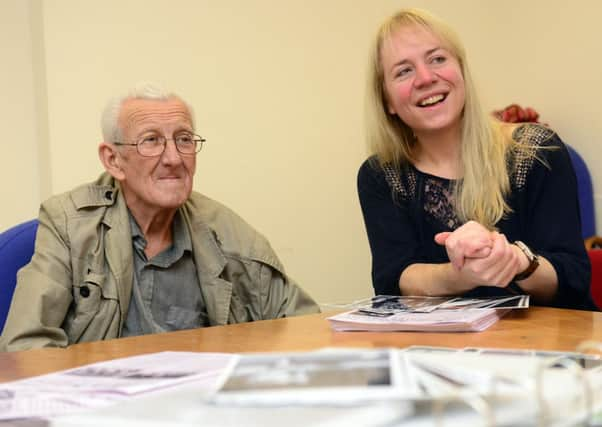Sporting memories used to unite lonely


Unlocking sporting memories has become a powerful tool to help tackle loneliness, depression and dementia among older people across Yorkshire.
Founded by former psychiatric nurse Tony Jameson-Allen and business partner Chris Wilkins, Sporting Memories uses traditional ideas of reminiscence activities to bring together like minded people to discuss their love of the game.
Advertisement
Hide AdAdvertisement
Hide AdWhether it be rugby league, football, boxing or athletics, by using old photographs, newspaper articles and memorabilia, discussion is helping once-isolated people forge new friendships and get back into sport themselves.
“Lonely older men are particularly hard to reach, but we’ve been astounded by how successful this has been. They might have watched Leeds Rhinos for years but now there’s an empty seat in the stands, perhaps their wife passed away, and they lost confidence in social situations,” Mr Jameson-Allen said.
“The people who come along might be lonely, or have a problem with depression, but the one thing they have in common is a love of sport. Any health problems or social issues are put aside for a couple of hours so people can have fun, laughter and reminiscence about great sporting moments, may it be what they did during PE at school, or England winning the world cup.
The first Sporting Memories project launched in 2011 in care homes across Leeds, and soon expanded after securing a grant to train up people from 50 organisations across the city.
Advertisement
Hide AdAdvertisement
Hide AdSince then, the success of Sporting Memories has seen projects commissioned across York, Kirklees, Sheffield and beyond, at sports stadiums, museums, libraries, community centres, care homes and even hospital wards.
During the Grand Depart, Sporting Memories helped make Le Tour in Yorkshire dementia friendly, holding reminiscence sessions, and the charity has won a raft of high profile support.
Prime Minister David Cameron has shared his sporting memories, as have the likes of Olympians Sir Steve Redgrave and Katherine Graingerbut also F1 drivers, footballers, cricketer. Even AC/DC singer Brian Johnson is a supporter, and shared a memory of being unable to afford tickets to see his beloved Newcastle United as a child, and walking to watch his local Gateshead instead.
Last week, Sir Bobby Charlton helped launched one of Sporting Memories’ most exciting projects yet, working with the National Football Museum to creating a Memories of 1966 exhibition to mark the 50th anniversary of England hosting - and winning - the World Cup in 1966.
Advertisement
Hide AdAdvertisement
Hide AdBut across Yorkshire, it is having a real benefit in the lives of many older people.
Mr Jameson-Allen, of Topcliffe, North Yorkshire, added: “A lot of reminiscence draws people to talking about what they’ve lost, but sport is a subject where there are a lot more happier memories.
“You see a group of people really gelling, friendships begin to form and people become less lonely.”
For more information or to get involved visit www.sportingmemoriesnetwork.com.
Advertisement
Hide AdAdvertisement
Hide AdA SIMPLE cup of tea will be used as a force to help tackle loneliness in older people after a £300,000 funding win.
The Royal Voluntary Service (RVS) will use cash from the People’s Postcode Lottery to expand its Good Neighbours service, which matches older people with a volunteer to offer companionship and practical help, be it walking the dog, helping with shopping or just a cup of tea and a chat. RVS chief executive David McCullough, said the money would provide a lifeline to many. He added: “Never underestimate the power of a friendly face popping in for a cuppa and a chat.”